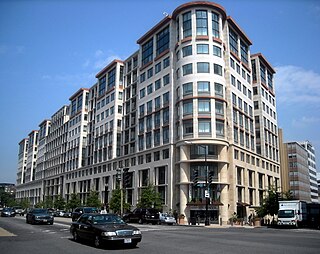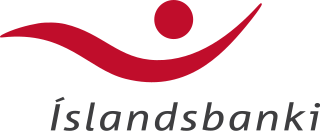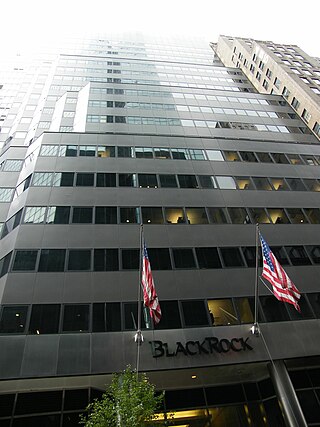Related Research Articles

Finance is the study and discipline of money, currency and capital assets. It is related to, but not synonymous with economics, the study of production, distribution, and consumption of money, assets, goods and services . Finance activities take place in financial systems at various scopes, thus the field can be roughly divided into personal, corporate, and public finance.

Nordea Bank Abp, commonly referred to as Nordea, is a European financial services group operating in northern Europe and based in Helsinki, Finland. The name is a blend of the words "Nordic" and "idea". The bank is the result of the successive mergers and acquisitions of the Finnish, Swedish, Danish, and Norwegian banks of Merita Bank, Nordbanken, Unidanmark, and Christiania Bank og Kreditkasse that took place between 1997 and 2001. The Nordic countries are considered Nordea's home market, having finalised the sales of their Baltic operations in 2019. Nordea is listed on Nasdaq Nordic exchanges in Helsinki, Copenhagen, and Stockholm and Nordea ADR is listed in the US.

The International Finance Corporation (IFC) is an international financial institution that offers investment, advisory, and asset-management services to encourage private-sector development in less developed countries. The IFC is a member of the World Bank Group and is headquartered in Washington, D.C. in the United States.
Investment banking pertains to certain activities of a financial services company or a corporate division that consist in advisory-based financial transactions on behalf of individuals, corporations, and governments. Traditionally associated with corporate finance, such a bank might assist in raising financial capital by underwriting or acting as the client's agent in the issuance of debt or equity securities. An investment bank may also assist companies involved in mergers and acquisitions (M&A) and provide ancillary services such as market making, trading of derivatives and equity securities, FICC services or research. Most investment banks maintain prime brokerage and asset management departments in conjunction with their investment research businesses. As an industry, it is broken up into the Bulge Bracket, Middle Market, and boutique market.
In the field of finance, the term private equity (PE) refers to investment funds, usually limited partnerships (LP), which buy and restructure financially weak companies that produce goods and provide services. A private-equity fund is both a type of ownership of assets and is a class of assets, which function as modes of financial management for operating private companies that are not publicly traded in a stock exchange.

Venture capital is a form of private equity financing that is provided by venture capital firms or funds to startups, early-stage, and emerging companies that have been deemed to have high growth potential or which have demonstrated high growth. Venture capital firms or funds invest in these early-stage companies in exchange for equity, or an ownership stake. Venture capitalists take on the risk of financing risky start-ups in the hopes that some of the firms they support will become successful. Because startups face high uncertainty, VC investments have high rates of failure. The start-ups are usually based on an innovative technology or business model and they are usually from high technology industries, such as information technology (IT), clean technology or biotechnology.

3i Group plc is a British multinational private equity and venture capital company based in London, England. 3i is listed on the London Stock Exchange and is a constituent of the FTSE 100 Index.

Íslandsbanki is an Icelandic bank with roots tracing back to 1875, formerly being the domestic part of Glitnir banki hf., but on 15 October 2008 being split from the bankrupt Glitnir and reestablished into a new independent bank. The sole operations of the bank is to manage a branch network in Iceland, with a 20%-40% market share across all domestic franchise areas. As of 2022, the bank has 12 branches around Iceland.
The Nasdaq Iceland, formerly known as the Iceland Stock Exchange (XICE), is a stock exchange located in Iceland. It was established in 1985 as a joint venture of several banks and brokerage firms on the initiative of the central bank. Trading began in 1986 in Icelandic government bonds, and trading in equities began in 1991. Equities trading increased rapidly thereafter. A wide variety of firms are currently listed on the exchange, including firms in retail, fishing, transportation, banks, insurance and numerous other areas. Because of the small size of the Icelandic economy and the low cost of public listing, many of the companies traded on the XICE are relatively small and are relatively illiquid.
Kaupthing Bank was a major international Icelandic bank, headquartered in Reykjavík, Iceland. It was taken over by the Icelandic government during the 2008–2011 Icelandic financial crisis and the domestic Icelandic based operations were spun into a new bank New Kaupthing, which was subsequently renamed Arion Banki. All the non-Icelandic assets and debts remained with the now defunct Kaupthing Bank. Prior to its collapse it also allegedly loaned money to various parties with the purpose of buying Kaupthing shares.

BlackRock, Inc. is an American multi-national investment company based in New York City. Founded in 1988, initially as a risk management and fixed income institutional asset manager, BlackRock is the world's largest asset manager, with US$10 trillion in assets under management as of January 2022. BlackRock operates globally with 70 offices in 30 countries, and clients in 100 countries. Along with Vanguard and State Street, BlackRock is considered to be one of the Big Three index fund managers that dominate corporate America.

Carnegie Investment Bank AB is a Swedish financial services group with activities in securities brokerage, investment banking and private banking.

Natixis is a French corporate and investment bank created in November 2006 from the merger of the asset management and investment banking operations of Natexis Banques Populaires and IXIS.
FIH Erhvervsbank A/S is the sixth-largest bank in Denmark in terms of total assets. FIH is an integrated corporate and investment bank, offering selected services within capital and advisory services to Danish corporates and operates internationally under the name “Finance for Danish Industry”. FIH is headquartered in Copenhagen and operates from four local offices in Jutland. Year-end 2010, FIH had a total lending of approximately DKK [60] billion spread on roughly 4.000 corporate clients.

Macquarie Group Limited is an Australian global financial services group. Headquartered and listed in Australia, Macquarie employs more than 17,000 staff in 33 markets, is the world's largest infrastructure asset manager and Australia's top ranked mergers and acquisitions adviser, with more than A$737 billion in assets under management.
ALMC hf., formerly Straumur Investment Bank hf., is a regional investment bank headquartered in Reykjavík, Iceland.

The Icelandic financial crisis was a major economic and political event in Iceland that involved the default of all three of the country's major privately owned commercial banks in late 2008, following their difficulties in refinancing their short-term debt and a run on deposits in the Netherlands and the United Kingdom. Relative to the size of its economy, Iceland's systemic banking collapse was the largest experienced by any country in economic history. The crisis led to a severe economic slump in 2008–2010 and significant political unrest.
Impact investing refers to investments "made into companies, organizations, and funds with the intention to generate a measurable, beneficial social or environmental impact alongside a financial return". At its core, impact investing is about an alignment of an investor's beliefs and values with the allocation of capital to address social and/or environmental issues.
Askar Capital was an investment bank in Iceland (2007–2010) offering advisory services related to investments in alternative financial products. The bank was established at the beginning of 2007 after a series of mergers, building on its history from 1993 as a financial advisor. The specialities of Askar Capital were corporate finance, real estate investments and debt management. As an authorized Investment Bank, Askar Capital was regulated by the Financial Supervisory Authority, headquartered in Reykjavik. The bank was heavily affected by the collapse of the major Icelandic banks in October 2008. The company carried on but eventually filed for bankruptcy on July 14, 2010.

The Capital Markets Union (CMU) is an economic policy initiative launched by the former president of the European Commission, Jean-Claude Junker in the initial exposition of his policy agenda on 15 July 2014. The main target was to create a single market for capital in the whole territory of the EU by the end of 2019. The reasoning behind the idea was to address the issue that corporate finance relies on debt and the fact that capitals markets in Europe were not sufficiently integrated so as to protect the EU and especially the Eurozone from future crisis. The Five Presidents Report of June 2015 proposed the CMU in order to complement the Banking union of the European Union and eventually finish the Economic and Monetary Union (EMU) project. The CMU is supposed to attract 2000 billion dollars more on the European capital markets, on the long-term.
References
- ↑ "Vefur í vinnslu | Stefna hugbúnaðarhús | vefumsjónarkerfi-vefsíðugerð-heimasíðugerð". Archived from the original on 2012-09-11. Retrieved 2011-01-25.
- ↑ "2002 nr. 161 20. desember/ Lög um fjármálafyrirtæki". althingi.is. Retrieved 11 February 2015.
- ↑ "404 - Síða fannst ekki". Fjármálaeftirlitið. Retrieved 11 February 2015.
{{cite web}}: Cite uses generic title (help) - ↑ "Saga fjárfestingar er nýtt fyrirtæki á íslenskum fjármálamarkaði". mbl.is. Retrieved 11 February 2015.
- ↑ "Byrja á föstudegi til fjár". mbl.is. Retrieved 11 February 2015.
- ↑ "Saga Capital Investment Bank in Iceland becomes Saga Investment Bank | IceNews - Daily News". 3 November 2010.
- ↑ "Saga Capital fjárfestingabanki opnaður formlega". mbl.is. Retrieved 11 February 2015.
- ↑ "Vefur í vinnslu | Stefna hugbúnaðarhús | vefumsjónarkerfi-vefsíðugerð-heimasíðugerð". Archived from the original on 2012-09-09. Retrieved 2011-01-25.
- ↑ "Þrotabú Saga Capital vann í Hæstarétti". www.mbl.is (in Icelandic). Retrieved 2023-01-04.